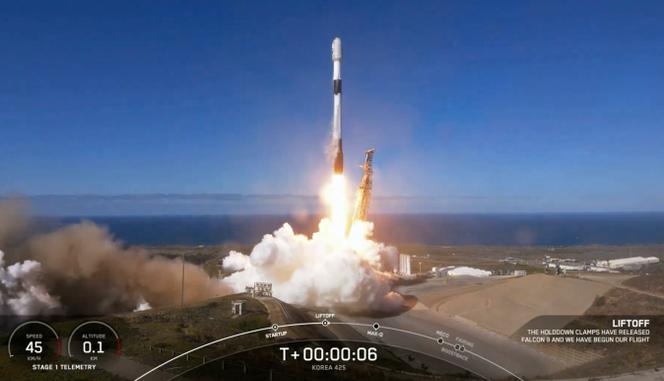


A SpaceX rocket on Friday, December 1, launched South Korea's first military spy satellite, intensifying a space race on the peninsula after Pyongyang launched its first military eye in the sky last week.
Seoul's reconnaissance satellite, carried by one of Elon Musk's SpaceX Falcon 9 rockets, lifted off from the Vandenberg US Space Force Base in California at 10:19 am local time. "It is a beautiful day for launch and Falcon nine has successfully lifted off from Vandenberg Space Force base," a SpaceX announcer said during a live broadcast.
The rocket was emblazoned with the word "KOREA" across it. If it is successfully put into orbit, South Korea will have acquired its first domestically built spy satellite to monitor nuclear-armed North Korea.
Set to orbit between 400 and 600 kilometers (250 to 370 miles) above Earth, Seoul's satellite is capable of detecting an object as small as 30 centimeters (11.8 inches), according to the Yonhap news agency. "Considering resolution and its capacity for Earth observation... our satellite technology ranks in the top five globally," the defense ministry official said, as quoted by Yonhap. Seoul plans to launch four additional spy satellites by the end of 2025 to bolster its reconnaissance capacity over the North. The launch comes less than two weeks after Pyongyang had successfully put its own spy satellite into orbit.
"Until now, South Korea has relied heavily on US-run spy satellites" when it comes to monitoring the North, Choi Gi-il, professor of military studies at Sangji University, told Agence France-Presse. While the South has "succeeded in the launch of a military communications satellite, it has taken much longer for a reconnaissance satellite due to higher technological hurdles," he said. Following the North's successful launch of its own spy satellite, Choi said, "the South Korean government needs to demonstrate it can also pull this off."
Experts have said putting a working reconnaissance satellite into orbit would improve North Korea's intelligence-gathering capabilities, particularly over South Korea, and provide crucial data in any military conflict. Since last week's launch, the North has claimed its new eye in the sky has provided images of major US and South Korean military sites, as well as photos of the Italian capital Rome. It has not yet disclosed any of the satellite imagery it claims to possess.
The North's launch of "Malligyong-1" was Pyongyang's third attempt at putting such a satellite in orbit, after two failures in May and August. Seoul has said the North received technical help from Moscow, in return for supplying weapons for use in Russia's war with Ukraine.
